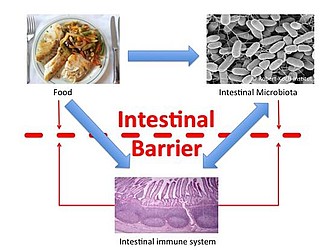Gastrointestinal barrier GI
Work group Prof. S.C. Bischoff, Dr. V. Volynets
Over the last few years, the evaluation/rating of the intestinal barrier changed significantly in relation to health and illness. Whereas the intestinal barrier has been considered as a pure mechanical delimitation, today, it is considered as a complex functional unit, which enables the transport of nutrients across the epithelium, but prevents the passage of damaging molecules and microorganisms.
A damaged intestinal barrier is considered a key factor for pathogenesis, a multitude of diseases . Chronically inflammatory intestinal disease (CED), irritable intestinal syndrome (RDS) and intestinal inflammation play a major role.
The type of disability trouble regarding the different diseases is often pronounced irregularly and defined improperly.
Our research is focused on nutrition and the gastrointestinal (GI) tract. In particular, we study the role of the GI barrier and the interaction between diet, commensal bacteria and the host’s mucosal immune system in the intestine under normal and inflammatory conditions.
For example, we aim to define molecular mechanisms, and how diet, food components and the intestinal microbiota affect the GI barrier at the level of mucus, enterocytes, immune cells and enteric neurons. In turn, we want to know how the GI barrier may shape the intestinal microbiota and the intestinal mucosal immune response. Such interactions are thought to be of relevance for inflammatory (e.g., IBD, IBS) and metabolic diseases (e.g., obesity, fatty liver disease) and thus might have major impacts on health and disease.
Our research project “Modulation of the intestinal barrier by intestinal microbiota – the role of food factors and mucosal immune system is sponsored by DFG.

